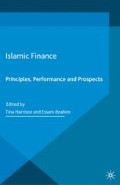Abstract
The teachings and guidelines in Islam encompass all aspects of human life. It governs all the daily activities of an individual. The Islamic Law or Shariah, as it has been derived from the Quran,1 Fiqh2 and Sunnah,3 governs all aspects of life and activities thereon of Muslims. It includes everything related to social, spiritual, ethical, economic or any other aspect of life.
Access this chapter
Tax calculation will be finalised at checkout
Purchases are for personal use only
Preview
Unable to display preview. Download preview PDF.
References and Notes
The holy book of Muslims. Al-Quran.
The Islamic Jurisprudence. It is derived from the earlier rulings and precepts based on Quran and Sunnah. This is defined for issues which has not been dealt directly in Quran or in Sunnah.
The sayings and practices of Prophet Muhammad, as have been revealed by his life and deeds.
Ainley, M., Mashayekhi, A., Hicks, R., Rahman, A. and Ravalia, A. (2007) Islamic Finance in the UK: Regulation and Challenges. UK: Financial Services Authority.
Abderrezak, F. (2008) The performance of Islamic equity funds — A comparison to conventional, Islamic and ethical benchmarks. Thesis submitted to the Department of Finance of the University of Maastricht in partial fulfillment of the requirements for the degree of Master of International Business-Finance.
Abdi, S. (2009) Islamic Funds and Investment Report 2009 — Surviving and Adapting in a Downturn. Ernst and Young, Luxembourg, LUX, http://www.ey.com/Publication/vwLUAssets/the-islamic-funds-investments-report-0509/$FILE/the-islamic-funds-investments-report-0509.pdf, accessed 27 September 2010.
Alam, N. and Shanmugam, B. (eds.) (2007) Islamic Finance: The Challenges Ahead. Kuala Lumpur, Malaysia: University Putra Malaysia Press.
Haron, S., Alam, N. and Shanmugam, B. (2007) Islamic Financial System: A Comprehensive Guide. Kuala Lumpur, Malaysia: Insight Network.
Zamir, I.Z. and Tsubota, H. (2009) The World Bank, emerging Islamic capital markets — A quickening pace and a new potential. World Bank Report by World Bank, 2009, http://treasury.worldbank.org/cmd/pdf/Euromoney_2006_Handbook_International_Debt_Capital_Markets.pdf, accessed 27 September 2010.
Ball, R. and Brown, P. (1968) An empirical evaluation of accounting income numbers. Journal of Accounting Research 6(2): 159–178.
Leahy, J. (2008) Socially responsible investing — The quest for financial return and social good. Accountancy Ireland 40(6): 47–49.
Deegan, C. and Unerman, J. (eds.) (2007) Financial Accounting Theory-European Edition. Berkshire, UK: McGraw-Hill, pp. 121–253.
Wade, A. (2009) Crossing over to Islamic banking. Timesonline, 12 March 2009, http://business.timesonline.co.uk/tol/business/law/article5889624.ece, accessed 21 April 2009.
Moscowitz, M.R. (1972) Choosing socially responsible stocks. Business and Society Review 1: 71–75.
Hamilton, S., Hoje, J. and Statman, M. (1993) Doing well while doing Good? The investment performance of socially responsible mutual funds. Financial Analysts Journal 49(November/December): 62–66.
Bello, Z.Y. (2005) Socially responsible investing and portfolio diversification. The Journal of Financial Research 28(1): 41–57.
Bauer, R., Koedijk, K. and Otten, R. (2005) International evidence on ethical mutual fund performance and investment style. Journal of Banking and Finance 29(7): 1751–1767.
Elfakhani, S. and Hassan, M.K. (2005) Performance of Islamic Mutual Funds, Economic Research Forum, 12th Annual Conference; 19–21 December, 2005, Cairo, Egypt, http://www.failaka.com/downloads/KHassan_PerfIsamicFunds_Dec05.pdf, accessed 28 September 2010.
Barnett, M.L. and Salomon, R.M. (2006) Beyond dichotomy: The curvilinear relationship between social responsibility and financial performance. Strategic Management Journal 27(11): 1101–1122.
Areal, N., Silva, F. and Cortez, M.C. (2009) The performance of European socially responsible funds. Journal of Business Ethics 87: 573–588.
Renneboog, L., Ter Horst, J. and Zhang, C. (2008) The price of ethics and stakeholder governance: The performance of socially responsible mutual funds. Journal of Corporate Finance 14(3): 302–322.
Karen, B., Brailsford, T. and Humphrey, J. (2006) Do socially responsible fund managers really invest differently? Journal of Business Ethics 65(4): 337–357.
Kempf, A. and Osthoff, P. (2008) SRI funds: Nomen est Omen. Journal of Business Finance and Accounting 35(9/10): 1276–1294.
Nilsson, J. (2008) Investment with a conscience: Examining the impact of pro-social attitude and perceived financial performance on socially responsible investment behaviour. Journal of Business Ethics 83(2): 307–325.
Abramovich, G. (2006) More managers link SRI to performance. Money Management Executive, 20 March: 10/22.
Abdullah, F., Hassan, T. and Mohamed, S. (2007) Investigation of the performance of Malaysian Islamic unit trust funds: Comparison with conventional unit trust funds. Managerial Finance 33: 142–153.
Hoepner, A.G.F., Rammal, H.G. and Rezec, M. (2010) Islamic Mutual Funds’ Financial Performance and International Investment Style: Evidence from 20 Countries. Working Paper, School of Management, University of St. Andrews. 2009, http://ssrn.com/abstract=1475037, accessed 22 February 2010.
Kraeussl, R. and Hayat, R. (2008) The Performance of Islamic Equity Funds. Working Paper. VU University Amsterdam — Amsterdam, NL.
Sadeghi, M. (2008) Financial performance of Shariah compliant investment: Evidence from Malaysian stock market. International Research Journal of Finance and Economics 20: 15–26.
S&P Europe 350 Constituent List, Standard and Poor, http://www2.standardandpoors.com/portal/site/sp/en/us/page.topic/indices_euro350/2,3,2,5,0,0,0,0,0,2,3,0,0,0,0,0.html, accessed 25 July 2009.
S&P 350 Shariah Constituents List, Standard and Poor, http://www.dbxtrackers.co.uk/EN/showpage.asp?pageid=143&inrnr=157&pkpnr=306&stinvtyp=privinv, accessed 25 July 2009.
Sharpe, W.F. (1994) The Sharpe ratio. Journal of Portfolio Management 21(1): 49–58.
The T bond rates have been obtained from the Wall Street Journal’s European website and are available at, http://online.wsj.com/mdc/public/page/2_3020-treasury-20080619.html?mod=mdc_pastcalendar.
Author information
Authors and Affiliations
Editor information
Editors and Affiliations
Rights and permissions
Copyright information
© 2016 The Editor(s)
About this chapter
Cite this chapter
Alam, N., Rajjaque, M.S. (2016). Shariah-Compliant Equities: Empirical Evaluation of Performance in the European Market during Credit Crunch. In: Harrison, T., Ibrahim, E. (eds) Islamic Finance. Palgrave Macmillan, Cham. https://doi.org/10.1007/978-3-319-30918-7_8
Download citation
DOI: https://doi.org/10.1007/978-3-319-30918-7_8
Publisher Name: Palgrave Macmillan, Cham
Print ISBN: 978-3-319-30917-0
Online ISBN: 978-3-319-30918-7
eBook Packages: Economics and FinanceEconomics and Finance (R0)

